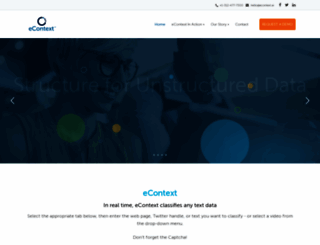Semantic Text Classification | eContext Taxonomy and Data Structure |
Page Load Speed
2.2 sec in total
First Response
25 ms
Resources Loaded
1.6 sec
Page Rendered
600 ms

About Website
Click here to check amazing EContext content. Otherwise, check out these important facts you probably never knew about econtext.ai
eContext, the world’s largest semantic text classification engine, classifies content instantly. Find out how to structure data from any text source.
Visit econtext.aiKey Findings
We analyzed Econtext.ai page load time and found that the first response time was 25 ms and then it took 2.2 sec to load all DOM resources and completely render a web page. This is quite a good result, as only 45% of websites can load faster.